MercoPress. South Atlantic News Agency
Tag: Nicolas Maduro
-
Tuesday, September 26th 2017 - 10:00 UTC
Canada will impose targeted sanctions against 40 Venezuelan top officials including Maduro

Canada will impose targeted sanctions against 40 Venezuelan senior officials, including President Nicolás Maduro, to punish them for “anti-democratic behavior,” the foreign ministry announced. Canada’s move, which followed a similar decision by the United States, came after months of protests against Maduro’s government in which at least 130 people have been killed.
-
Wednesday, September 20th 2017 - 07:47 UTC
Trump threatens “rocket man” with total destruction; warnings to Iran, Syria, Cuba and Venezuela
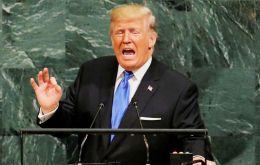
U.S. President Donald Trump said on Tuesday that the United States will be forced to “totally destroy” North Korea unless Pyongyang backs down from its nuclear challenge, mocking North Korean leader Kim Jong Un as a “rocket man” on a suicide mission.
-
Tuesday, September 19th 2017 - 09:48 UTC
Venezuela “free of the dollar tyranny” publishes oil and fuel prices in Chinese Yuan
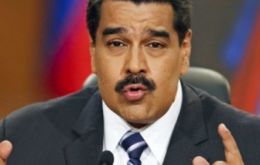
Venezuela published the price of its oil and fuel in Chinese currency on Friday in what it called an effort to free the socialist-run country from the “tyranny of the dollar,” echoing a plan recently announced by President Nicolas Maduro.
-
Friday, September 15th 2017 - 07:38 UTC
Venezuela plans to abandon the dollar; greenback currently sells for 22.400 Bolivar
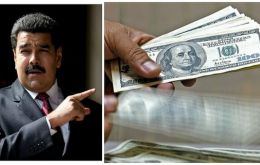
Venezuela temporarily suspended the sale of U.S. dollars through its Dicom auction system, following an announcement last week that it was moving away from the greenback in response to U.S. sanctions. The United States in August prohibited dealings in new debt from Venezuela and state oil company PDVSA in response to the creation of a new legislative super-body that critics call the consolidation of a dictatorship.
-
Wednesday, September 6th 2017 - 07:23 UTC
Spain pushing EU to adopt measures against members of Venezuela's government
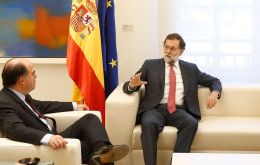
Spain is pushing for the European Union to adopt restrictive measures against members of the Venezuelan government as a way of encouraging a return to constitutional order in the crisis-hit country, the Spanish foreign ministry said on Tuesday.
-
Saturday, August 26th 2017 - 08:17 UTC
Maduro reacts to Trump's sanctions: “we will sell our oil to other markets”
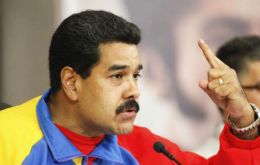
Venezuela's President Nicolás Maduro has said that a preliminary analysis shows that new financial sanctions imposed by the United States will lead to a halt in oil exports to the US. President Trump's order bans trade in Venezuelan debt and blocks its state oil firm from selling bonds in the US.
-
Thursday, August 24th 2017 - 10:07 UTC
Venezuela ousted chief prosecutor says she has evidence of Maduro and allies corruption
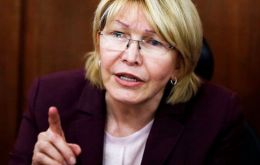
Venezuela's recently ousted chief prosecutor accused President Nicolas Maduro and several allies on Wednesday of participating in acts of corruption, saying she would turn over proof that would help other countries prosecute. Venezuela's government quickly fired back, accusing Luisa Ortega Diaz of “grave moral and ethical infractions.”
-
Wednesday, August 23rd 2017 - 09:25 UTC
British minister condemns removal of legislative powers from Venezuelan elected National Assembly
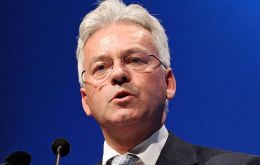
The British Minister for Europe and the Americas, Sir Alan Duncan, strongly condemned the decision from the Venezuela Constituent Assembly announcing it will take over the established National Assembly's powers.
-
Friday, August 18th 2017 - 08:50 UTC
Venezuela begins systematic purge of the regime's opponents
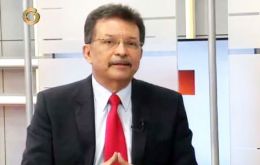
Venezuela’s high court issued an arrest order for the ousted chief prosecutor’s husband on Thursday after authorities accused him of running a US$6 million extortion ring, a ruling promptly denounced by government critics as a move aimed at silencing opponents of President Nicolas Maduro.
-
Tuesday, August 8th 2017 - 08:14 UTC
Corbyn condemns “violence by all sides”, but avoids criticizing Maduro
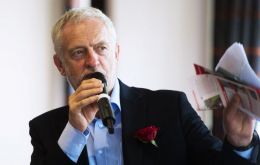
Jeremy Corbyn has condemned the “violence done by all sides” in the Venezuela conflict but stopped short of criticising president, Nicolas Maduro.
